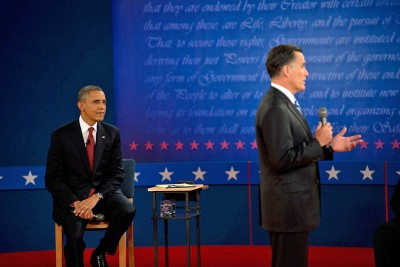There were no questions about education in the second presidential debate, held on Tuesday night, but both President Barack Obama and Republican candidate Mitt Romney brought it up often during a town hall meeting with undecided voters. Both men spoke largely in generalities about the need to improve the country’s schools and offered up their track records as proof they would be able to do so.

President Obama and Mitt Romney at the second presidential debate on Oct. 16. (Photo by Scout Tufankjian/Obama for America)
In the past month, the Obama campaign has sought to draw a distinction between Obama’s and Romney’s willingness to invest in education. Carrying on that effort, Obama in particular steered the conversation toward education multiple times, making links between gun violence and school performance, and student loans and workplace equality for women.
While answering a question about assault rifles, Obama emphasized the importance of improving the country’s schools, reiterating claims that his opponent doesn’t want to hire more teachers. “When Governor Romney was asked whether teachers, hiring more teachers, was important to growing our economy, Governor Romney said that doesn’t grow our economy,” Obama said before he was interrupted by moderator Candy Crowley of CNN.
“The question, Mr. President, was guns here,” she said. “I need us to move along.”
Romney was not given a chance to respond, but has said that hiring teachers won’t help the economy. He did, however, agree with Obama’s basic premise that there was a relationship between violence and education.
Romney boasted about his own education track record, mentioning twice during the debate that Massachusetts’ schools were ranked first in the country during his tenure as governor. “I was able also to get our schools ranked number one in the nation, so 100 percent of our kids would have a bright opportunity for a future,” Romney said.
The state did perform the highest on the country’s National Assessment of Educational Progress when Romney was in office, but has consistently topped the list for decades. The state also does well – if not the best – in other ratings.
Romney also mentioned the John and Abigail Adams Scholarship Program on his list of education achievements in the state. The scholarship awarded students who performed in the top 25 percent of their class on high school exams with a full-tuition scholarship to in-state public universities and colleges. Research suggests that this program, however, may actually be detrimental to students because it entices them to choose lower quality options where it takes them longer to complete their degrees.
Obama took time to tout his track record as well, mentioning that he’d worked with governors in 46 states to institute reforms – such as adoption of the Common Core State Standards and changes to teacher evaluation systems – and worked to make college more affordable.
“We’ve expanded Pell Grants for millions of people, including millions of young women, all across the country,” Obama said while answering a question about equality in the workplace. “We did it by taking $60 billion that was going to banks and lenders as middlemen for the student loan program, and we said, let’s just cut out the middle man. Let’s give the money directly to the student.”
Romney has said that he wants to reinstate private banks in the student-loan market. He used the debate to reiterate a recently articulated support for Pell Grants, which go to low-income students.
His running mate, Paul Ryan, has called for tightening eligibility requirements for the grants and leaving unchanged the maximum amount available. Earlier in the month, Romney said he thought the maximum should increase along with inflation, and he repeated the idea Tuesday. “I want to make sure we keep our Pell Grant program growing,” he said.



